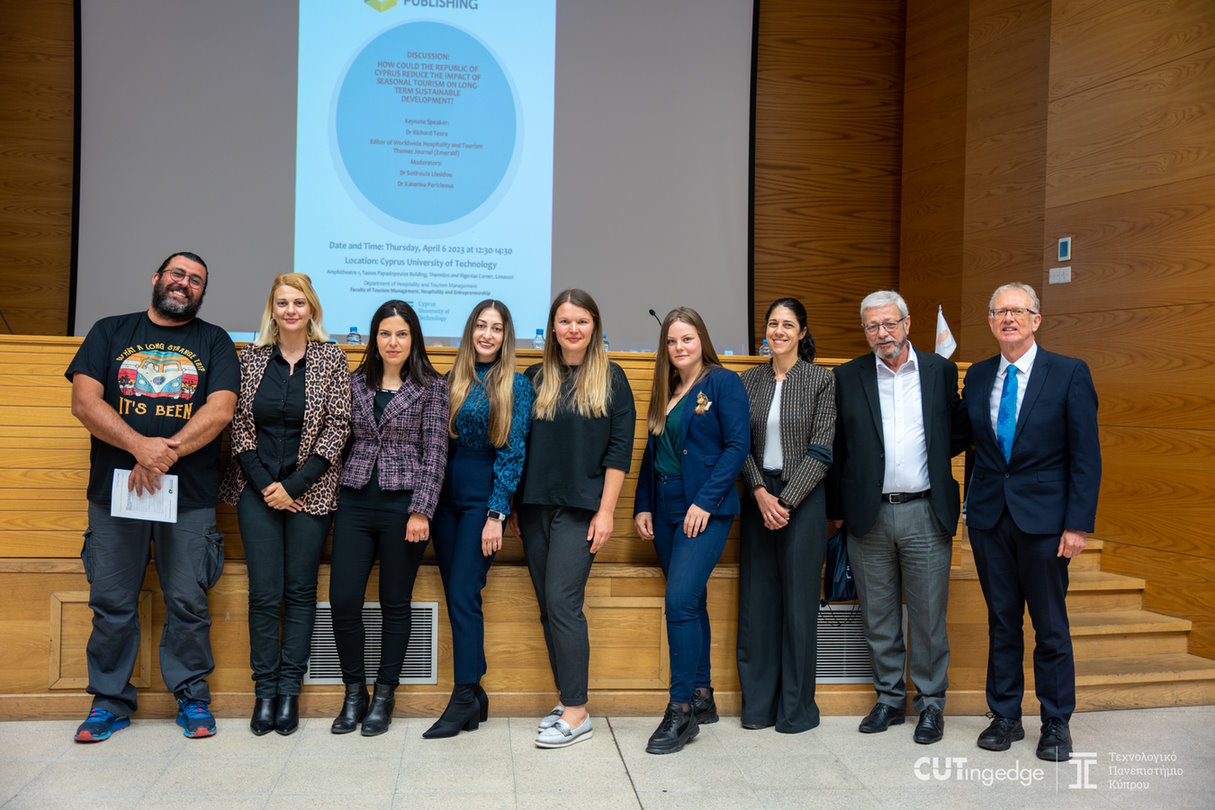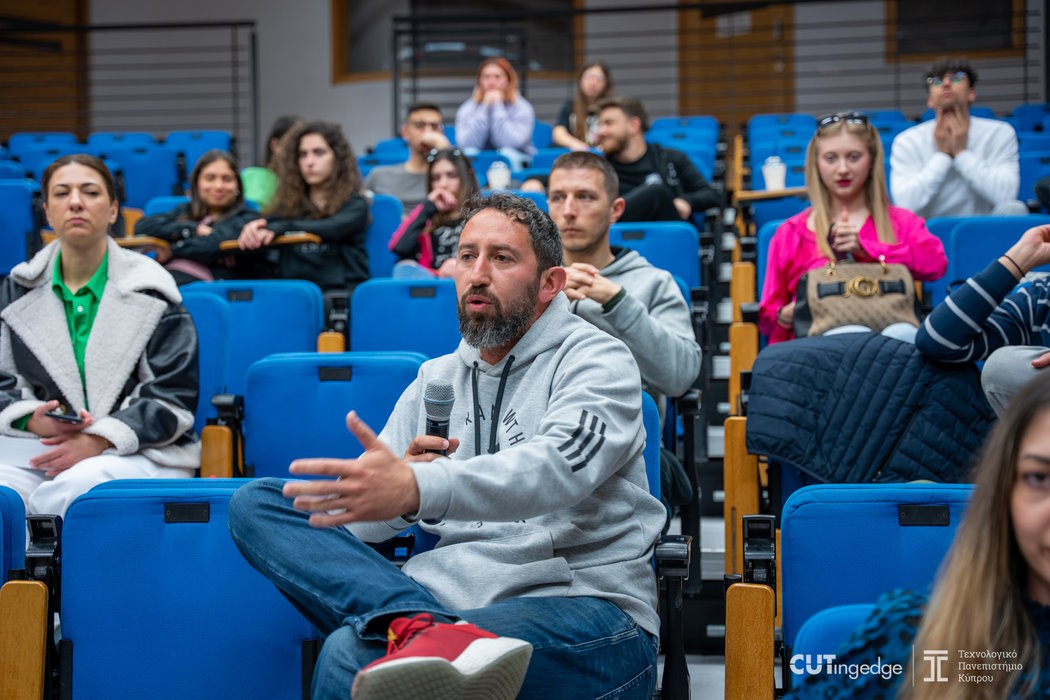Theme Issue Launch Event and Discussion at Cyprus University of Technology (CUT)
Limassol, Cyprus, Thursday 06 April 2023
Worldwide Hospitality and Tourism Themes (WHATT) v14 n5 2022
Theme Editors Zanete Garanti and Galina Berjozkina
How could the Republic of Cyprus reduce the impact of seasonal tourism on long-term sustainable development?
A discussion between academics, industry, local and national government representatives, professional association and environmental and policy specialists.
The session opened with an overview of Emerald and the work of Worldwide Hospitality and Tourism Themes (WHATT) provided by Richard Teare, followed by the main findings and next step discussion points presented by Zanete Garanti and Galina Berjozkina
Why is this theme issue question important?
For decades Cyprus has been a well-known sun and sea destination which means that there is a very busy tourism season in the summer months and very limited tourism in the winter months. The negative economic, social and environmental impacts of high seasonality are well known to private and public sector stakeholders and this problem was highlighted at the 2021 theme issue (WHATT v13 n6, 2021) launch event, where participants agreed that the main barrier to long term tourism sustainability is the dramatic fluctuation in tourism activity. This can be described as over tourism in the summer months, followed by low levels of activity, a significant loss of income and challenges relating to workforce and resource planning. Theme editors Zanete Garanti and Galina Berjozkina

The presentation team at the Cyprus University of Technology:
Representatives from academia and government
Our planning objective for the theme issue was to enable diverse groups of stakeholders to participate. We were able to accomplish this and so every article uncovers valuable insights on the issue of seasonality and its impact on the life and economy of Cyprus. Personal contacts are very important in Cyprus, and it was to our advantage that we were already familiar with many stakeholders due to our initial theme issue in 2021, so the response rate from stakeholders was much higher in support of this follow-on issue. It is envisaged that the theme issue and the launch event discussion and outcomes will facilitate progress now and in the future.
Analysis, findings and next steps
Our theme issue explored the various in-depth causes and effects of tourism seasonality and provided approaches and strategies to tackle it. Fluctuations in tourism activity not only have short term implications (such as loss of income and an inability to retain a skilled workforce) but they also have a long-term impact on overall development and sustainability. The longer it takes to tackle the seasonality issue and develop Cyprus as a sustainable year-round destination, the more significant the long-term impacts will be.
In addressing seasonality issues and developing strategies to extend the tourism season, there are both supply and demand factors to address. First, new tourism products and services have to be created to satisfy the demand of travellers and attract them in the low season. The possibilities include alternative, special interest, winter, rural, food and other types of tourism. For example, one of the articles in the theme issue proposes cluster establishment to develop gastro tourism products and experiences. That said, although supply is significant, the main challenge is to generate demand in new market segments so that a more diverse range of visitors can be attracted throughout the year. In this context, our theme issue explores opportunities to attract growth market segments like technology savvy young travellers and people with disabilities.

Launch event and discussion: some of the participants representing key stakeholders in sustainable tourism development, hosted by the Cyprus University of Technology, Limassol, Cyprus, Thursday 06 April 2023
Zanete Garanti and Galina Berjozkina provided a summary of the theme issue findings from the perspective of the theme editors and the contributing team of academics and industry practitioners.
Event discussion and summary:
Doros Georgiades, Head of International Relations, Visit Cyprus spoke about efforts to change the image of Cyprus from a sun and sea summer destination to a year-round location for off-peak activity holidays and cultural experiences. Recognising the challenge of seasonal overtourism, he said that currently, Cyprus receives 4-5 million visitors in the summer period and the objective is to attract an additional one million visitors in the Spring and Autumn period. This is objective will help to ensure that the existing tourism infrastructure is used during off-peak periods without adding additional summer period pressure.
Different policies and strategies have been developed over the years in an effort to address tourism seasonality but with little progress. The new National Tourism Strategy 2030 aims to find enduring solutions to seasonality problems and develop Cyprus as an all year-round destination. While public bodies have developed the necessary strategies, we sought to explore the perspectives of various stakeholders as to how to mitigate the effects of tourism seasonality and in so doing, provide complementary and in-depth perspectives on the possible solutions to the problem.
In summary, one of the most significant drawbacks of all previous strategies and policies has been the inability to take a stakeholder approach and involve various stakeholders (especially communities) in strategy, policy development and decision making. For successful implementation, stakeholders have to find a way to focus on local communities, entrepreneurs, initiatives and decision making at a local level.
WHATT Managing Editor Richard Teare offered his thanks Cyprus University of Technology, Limassol for hosting the event and to Zanete and Galina, the WHATT v14 n5 theme issue editors for their outstanding academic and professional leadership, organisation and oversight of the writing team from academia and industry. Together, the team have produced an excellent follow-on theme issue that offers numerous practical steps to reduce the impact of seasonal tourism on long-term sustainable development in Cyprus. A launch event discussion would not have been possible without the presence of stakeholder representatives from government, industry, professional associations and academia (including members of the writing team) and we are most grateful to them for their thoughtful and constructive inputs. In so doing, they have helped to frame some next steps for sustainable tourism development in Cyprus, with wider application to other small island developing states.
Zanete Garanti and Galina Berjozkina and Richard Teare
April, 2023
